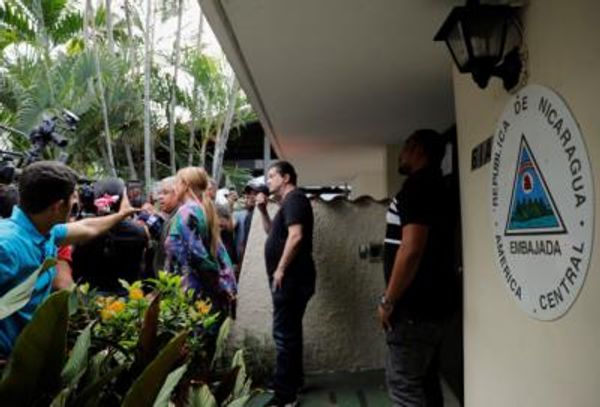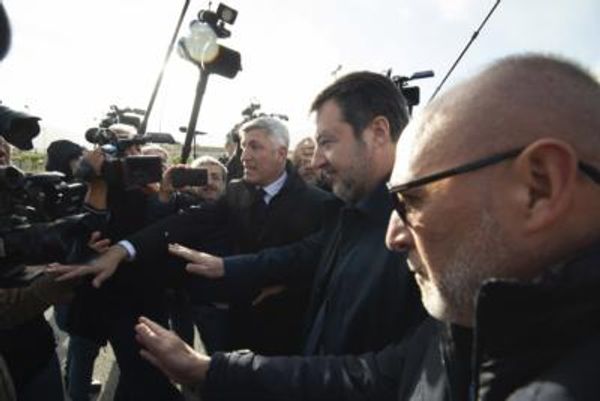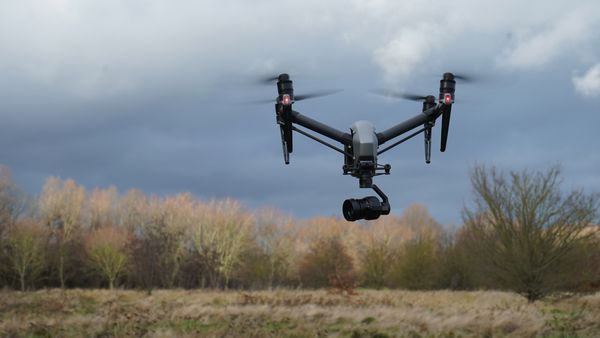
IN A MANNER OF SPEAKING
Former Liberal staffer Fiona Brown says she felt “threatened and intimidated” after being “berated” by the ACT’s top prosecutor, The Australian ($) reports. She said director of public prosecutions Shane Drumgold refused to put her on the stand again to refute what she called “false” evidence, and that he told her she was close to providing inadmissible evidence because of her answers in court, which made her feel “humiliated”. Brown also said she raised a red flag about TV presenter Lisa Wilkinson’s Logie nomination, saying the interview with former Liberal staffer Brittany Higgins caused Brown reputational damage and distress, but claimed Drumgold was “dismissive”. The paper declared them “explosive allegations”, which honestly feels like a bit of a stretch, but anyway.
Meanwhile the ABC is standing by a TV/radio story that claimed an Alice Springs town hall meeting promoted white supremacy “without providing any evidence”, the Herald Sun primly declared… apart from the several attendees who told Indigenous affairs reporter and Quandamooka woman Carly Williams it was a “disgusting display of white supremacy”, that is. The Save Alice Springs meeting was held on Monday, with families, business owners and Indigenous leaders in attendance — but Alice Springs mayor Matt Paterson called for the ABC to retract its report, claiming only critical voices were featured. Check it out here via the Daily Mail. Speaking of media under attack — the personal info of 140 current and former staff at The Guardian and Guardian Australia might’ve been stolen in a cyberattack, the SMH reports, including tax file numbers, bank account details, superannuation information, salaries and addresses (!). Yikes.
REFERENDUM ON, WIN OR LOSE
There’ll be a referendum on the Voice to Parliament even if the Coalition’s opposition means it has no hope of succeeding, Guardian Australia reports. The thing with referendums is usually they fail when both major parties don’t support the question — and the Liberals are yet to say whether they’re on the Yes or No side (the Nats are No). Nevertheless, Prime Minister Anthony Albanese told the paper he would put the question to the public, because to delay or ditch the referendum would be like “worrying about winning a grand final, so therefore you don’t run on the field and forfeit”. But Parliament could kill the referendum, Albo admitted — we need two bills for the vote, one that would update Australia’s referendum machinery, and another that laid out the wording of the question. We’d need a majority to get them through, including in the Greens-heavy Senate.
Meanwhile Opposition Leader Peter Dutton and opposition spokesman on Indigenous Australians Julian Leeser were quite unmoved by a meeting with the referendum working group yesterday, the National Indigenous Times reports. Leeser said he didn’t learn anything new, The New Daily reports, and Dutton said he was not “much further down the track” in deciding where he stands. Meanwhile, the ABC reports a fourth sentence in the constitution explicitly recognising Aboriginal and Torres Strait Islander peoples as the traditional owners of Australia is on the cards. Albanese proposed three sentences at the Garma Festival, but a fourth has been added (and it actually comes first, with three points below): “In recognition of Aboriginal and Torres Strait Islander peoples as the First Peoples of Australia”.
PLAYING WITH FIRE
The office of former NSW deputy premier John Barilaro moved the goalposts of a bushfire recovery program, which led to “the exclusion of all projects in electorates held by the Labor Party”, the SMH reports. That was despite many Labor electorates suffering from the Black Summer inferno — including the Blue Mountains. It’s the finding of an investigation by the NSW auditor-general into the Bushfire Local Economic Recovery program — and Opposition Leader Chris Minns was livid. “Even communities that were suffering from a terrible natural disaster were subjected to pork-barrelling,” Minns said. So how did Barilaro’s office do it? It raised the threshold to $1 million for projects — and 21 of the 22 projects that met that new ceiling just randomly happened to be in Coalition seats, I guess (the other was independent, The New Daily adds). The auditor was like, why was Barilaro’s office even given info about what electorates the projects were in? What did it have to do with the funding? Barilaro declined to comment.
To the Queensland Coalition now and a former Brisbane councillor claims she was ditched as part of an LNP “conspiracy” over property development powerbroking, the Brisbane Times reports. Former Pullenvale councillor Kate Richards is suing several high-level LNP figures for defamation over a 2019 statement that disendorsed her and referred her to the corruption body. It cleared her, but she lost her seat to another LNP candidate anyway. So what’s this about? Richards’ lawyers say senior figures believed she’d become the new chair of Brisbane’s planning and economic development committee — and that position has the power to make big decisions about property development. Her side alleges Richards “could not be relied upon” to make the “right” ones, if you know what I mean. But the defence lawyers say that’s a total load of baloney, calling her claims untrue and scandalous.
ON A LIGHTER NOTE
Groundhog Day wasn’t the first movie to delve into the time loop — but it definitely kicked the genre into high gear, with hits Source Code, Edge of Tomorrow and Palm Springs among notable alumni. This sort of category — where a protagonist keeps living through the same day over and over, is frustratingly entertaining for the audience. Perhaps it rings so true to us because we can all feel like our daily life is on repeat sometimes (and never more so when we were stuck inside during the pandemic). But what if you chose to watch Groundhog Day every day, itself a movie about the same thing every day, while your days were the same every day? That’s exactly what cinephile Adam Daniel chose to do during lockdown. He was already struggling with frustration, ennui and a lack of progress — why not take control and turn it into an experiment?
So he watched the classic 1993 hit starring Bill Murray every single day for a year. At first, Daniel engaged with the narrative. He deduced that protagonist Phil was stuck in the same day for precisely 30 years and wondered how Rita fell in love with him in one day. Hey, he noticed, that kid in the wheelchair in the hospital scene is the one Phil saves! In his crazed rewatching, he began to theorise the bartender at the hotel with the knowing looks is in on the whole loop thing. A scandalised Daniel even spotted an affair — one of the locals brings two different women to two scenes. After Daniel watched it for the last time on day 365, he thought about what he’d learnt (apart from the dialogue, word for word). “Like every piece of worthwhile art,” he concluded, it can “sustain its own deep interrogation and reveal to the curious rewatcher its multifaceted layers and dimensions”. I’d meekly suggest reading the movie’s Wikipedia entry instead, but maybe I’m a total philistine.
Hoping today is a new day, and there’s a restful weekend ahead.
SAY WHAT?
In short, he’s the greatest Catholic Australia has produced and one of our country’s greatest sons … That’s the heroic virtue that makes him, to my mind, a saint for our times.
Tony Abbott
George Pell, who the former PM describes as perhaps “the greatest man I’ve ever known”, was found guilty on five counts of child sex abuse against two choirboys. It was later overturned. Separately, Victoria Police investigated two decades of allegations against Pell from 10 boys. A 2017 inquiry also found Pell was aware of the sexual abuse of children in 1974 and didn’t do enough to address it. Pell maintained his innocence until the end.
CRIKEY RECAP
Are Trump’s colleagues sort of hoping he’ll die before the next election?
“He’s been on the campaign trail for 2024 (it’s always election season in the US), going places he normally wouldn’t and largely striking an uncharacteristically conventional tone. Footage has been released of him at a fraud deposition pleading the Fifth Amendment (which prevents self-incrimination) a mere 400 times when asked about his financial affairs. He’s suing Bob Woodward. And most strikingly, some of his colleagues are idly fantasising about his death.
“According to The Atlantic, several Republican party figures are thinking that Trump — the figurehead of three consecutive poor showings for the party, and displaying no signs of going quietly into retirement — will finally have his legal troubles catch up with him before 2024. And if not… well… the Trump situation could ‘resolve itself naturally’.”
‘Professional misconduct’: the latest in the Lehrmann saga
“Lehrmann also claims the DPP failed to take reasonable steps to remove certain high-profile material from public circulation, such as Higgins’ Women’s March speech, the ABC Four Corners report, and the National Press Club address, all of which, he says, conceivably could have had a bearing on a fair trial.
“Beyond this, he alleges the DPP failed to warn Higgins and others about the risks associated with public comments before and during the trial, and that Drumgold effectively ‘defamed’ him by suggesting to media that a ‘successful prosecution was still possible’ after the original trial was aborted.”
A third ex-minister denies robodebt responsibility, as Christian Porter to take witness stand
“Another former Coalition minister whose responsibilities included administering robodebt has denied responsibility for the unlawful scheme. Alan Tudge, who served as human services minister between 2016 and 2017 under the Turnbull government, was the third ex-minister to face the royal commission into the program yesterday.
“Ex-ministers Marise Payne and Scott Morrison have gone before him; both said they weren’t aware the scheme was illegal. Christian Porter will take the witness stand later today. While Tudge administered the portfolio of human services, with responsibility for robodebt, he said he wasn’t aware the scheme was illegal, and that in any case would have been powerless to stop it.”
READ ALL ABOUT IT
Italy ‘complicit’ in crimes for renewing pact with Libya: NGOs (Al Jazeera)
Adani’s market losses top $100b as shelved share sale spooks investors (Reuters)
Finland passes new, progressive trans rights laws on gender recognition (EuroNews)
Netflix reveals first details about the password sharing crackdown (Stuff)
Analysis: the three biggest lessons from Auckland’s historic floods (NZ Herald)
Calls for bigger windfall tax after Shell makes ‘obscene’ $40b profit (The Guardian)
Hunter Biden threatens legal action over laptop allegations (BBC)
THE COMMENTARIAT
Despite the hype, Qantas’ midair turnbacks are a sign of strong safety systems — Alan Joyce (The SMH) ($): “When you’re the CEO of Qantas, people are always keen to tell you how they think the airline is doing. Whatever their feedback is, I always see it first and foremost as a reflection of the strong connection Australia has with its national carrier. To be honest, we know that connection has been tested at times. Six months ago, a lot of people felt we’d let them down and the figures showed why. Almost half our flights were late, our rate of misplaced bags had more than doubled and we were cancelling up to 7% of our schedule.
“Perception-wise, it didn’t help that this came after some controversial restructuring decisions to make sure we survived COVID. And it didn’t matter that airlines around the world had the same problems as travel restarted. If your flight to the Gold Coast has just been cancelled, it doesn’t make you feel any better to hear the delays are worse in Amsterdam. Knowing that we were routinely letting customers down was hugely disappointing for everyone at Qantas. Last August, we apologised and promised to fix it. And almost every week after that, things improved. We’ve now been the most on-time of the major domestic airlines for five months in a row.”
Share benefits of capitalism or risk liberal democracy — Rod Sims (The Australian) ($): “It is, I think, also not widely understood that the essence of well-accepted corporate strategy theory and practice is for companies to seek to gain market power. Profits from ‘outrunning’ many competitors by aiming for better products are usually small and/or temporary as prices are set by the market where many players are competing fiercely. Alternatively, profits from exercising market power are large and continuing because, with the degree of freedom provided, companies can achieve prices above competitive levels. In Michael Porter’s famous 1979 article, he described how companies generally actively seek market power through lowering competition, raising entry barriers to would-be competitors, or gaining some continuing ‘hold’ over consumers. And when companies have market power, they should seek to protect it.
“Warren Buffett has repeatedly said he only invests in companies with ‘moats’ around them. He means companies that are in significant ways protected from competition. Company actions and objectives are therefore often at odds with the approaches and objectives of antitrust, and with good public policy. When companies seek to lower competition by a merger, or seek to block competitors, it is no accident. It is what they actively seek to do because it is the way towards higher profits. Some believe businesses only succeed by looking after the interests of consumers. This is naive; it ignores market power. Companies must have regard to their consumers. The level of attention companies pay to their customers will, however, usually depend on how much competition they face.”
HOLD THE FRONT PAGE

WHAT’S ON TODAY
Kulin Nation Country (also known as Melbourne)
-
University of Denver’s Suisheng Zhao, La Trobe University’s Yangbin Chen, University of Melbourne’s Dan Hu will discuss Chinese President Xi Jinping’s vision for China in the world and what other regions should expect, in an event at La Trobe and online.










